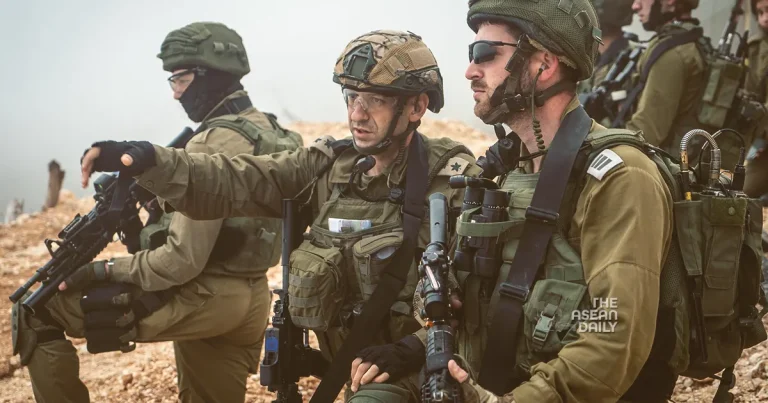26-10-2023 (TEL AVIV) Israeli Prime Minister Benjamin Netanyahu announced on Wednesday (Oct 25) that Israel is making preparations for a ground invasion of Gaza. This statement comes amidst escalating Israeli shelling, which has resulted in the deaths of numerous Palestinian civilians. International pressure is also growing, urging Israel to deliver aid and ensure the safety of hostages held by Hamas.
US President Joe Biden, in a speech that looked beyond the ongoing conflict, expressed support for a two-state solution involving Israel and the Palestinians. He emphasized the importance of integrating Israel among its Arab neighbors and stated that both Israelis and Palestinians deserve to live in safety, dignity, and peace. Biden made these remarks during a joint press conference in Washington with Australian Prime Minister Anthony Albanese.
Biden further speculated that one of the reasons behind the recent attack by Hamas militants on southern Israel, which resulted in the deaths of 1,400 people and the taking of over 200 hostages, was to hinder the normalization of relations between Israel and Saudi Arabia.
According to the Hamas-run health ministry in Gaza, Israeli retaliatory strikes have claimed the lives of more than 6,500 people. However, Reuters has been unable to independently verify these casualty figures for either side.
When questioned about the number of Palestinian casualties, Biden admitted that he had no way of confirming the accuracy of the reports. He acknowledged that innocent lives had undoubtedly been lost, but he argued that it was the inevitable cost of waging a war.
Meanwhile, at the United Nations, a US-drafted Security Council resolution calling for temporary ceasefires to facilitate the delivery of essential supplies to Palestinian civilians was vetoed by Russia and China. The United Arab Emirates also voted against the resolution, while ten members voted in favor and two abstained.
Russia proposed an alternative resolution that called for a broader ceasefire but failed to secure the necessary votes. Israel rejected both proposals, asserting that Hamas would exploit any cessation of hostilities to create new threats against Gaza civilians. Limited supplies of food, medicine, and water from Egypt resumed on Saturday through the Rafah crossing, the only entry point not controlled by Israel.
In Jerusalem, Prime Minister Netanyahu stated that the decision regarding the timing and details of a ground invasion would be made by the government’s special war cabinet. However, he declined to divulge any specific information about the operation.
Netanyahu declared, “We have already eliminated thousands of terrorists, and this is only the beginning.” He also confirmed that preparations for a ground invasion were underway. However, he refrained from disclosing specifics about when, how, or the number of troops involved, emphasizing that such information should remain confidential.
Israeli tanks and troops are currently stationed along the border with Gaza, awaiting orders. Approximately 360,000 reservists have been mobilized by Israel.
There is mounting international pressure to delay any potential invasion of Gaza, particularly due to concerns about the safety of the hostages. According to the Israeli government, over half of the estimated 220 hostages held by Hamas possess foreign passports from 25 different countries.
The Wall Street Journal reported, citing US and Israeli officials, that Israel has agreed to postpone a ground invasion for the time being, allowing the United States to deploy missile defenses to the region in order to protect US forces. This decision reflects the US’s apprehension about the Gaza conflict potentially spreading throughout the Middle East.
US officials have raised concerns with Israel that Iran and Iranian-backed Islamist groups could escalate the conflict by targeting US troops in the region. The incursion of Israeli forces into Gaza could serve as a trigger for Iranian proxies, they warned.
As Israel intensifies its bombings in southern Gaza, violence has erupted elsewhere in the Middle East. A major showdown is looming at the United Nations regarding aid for Palestinian civilians, hundreds of thousands of whom have fled from north to south in the small coastal strip.
Israel had previously warned the displaced population that it would primarily target the northern regions to eliminate Hamas militants.
Among the casualties on Wednesday, an internally displaced person was killed, and 44 others were injured in an airstrike near a United Nations Relief and Works Agency (UNRWA) school in the southern town of Rafah. UNRWA, which is responsible for Palestinian refugees in the strip, reported that the school, housing 4,600 people, suffered severe collateral damage.
The Israeli-Hamas conflict has already sparked increased tensions beyond Gaza’s borders. In response to rockets fired from Syria, an ally of Iran, Israeli warplanes targeted Syrian army infrastructure. Syrian state media claimed that eight soldiers were killed and seven were wounded near the southwestern city of Deraa, with Aleppo airport in the northwest also being hit.
While Israel did not directly accuse the Syrian army of launching the rockets, it remains suspicious of Iran’s significant military and security presence in Syria, considering Iran as its arch-enemy. Iran has long sought regional dominance and supports armed groups in Syria, Lebanon, and elsewhere, including Hamas. Iran has demanded that Israel cease its onslaught on Gaza.




